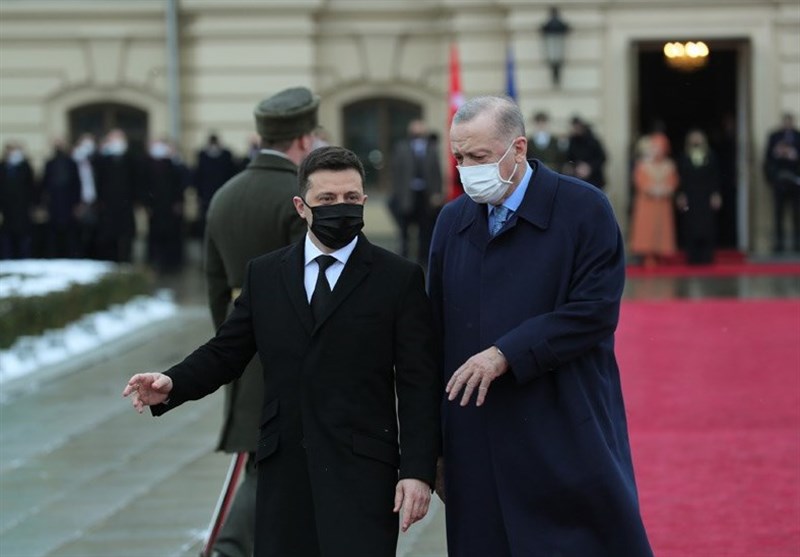Speaking in an interview with the website of the Strategic Council on Foreign Relations about the different dimensions of Erdogan’s concern over the conflict in the northern Black Sea region, Hassan Ashrafi said: Given the difficult times the Turkish economy is going through, one of Erdogan’s most important concerns seems to be the deteriorating economic situation in that country; an issue that could even threaten Erdogan’s chances of extending his presidency in the 2023 elections.
Noting that Turkey heavily relies on Russia in terms of economy, Ashrafi added: Millions of Russian tourists bring a lot of foreign currency into that country every year, and about 30% of the tourists who visit Turkey are from Russia and Ukraine.
The expert, quoting Burak Pehlivan, chairman of the Turkish-Ukrainian Business Association said: Russia and Ukraine are influential countries in supplying foodstuff to Turkey, as those two countries supply the major part of the wheat needed by Turkey. In total, the share of those two countries in product imports to Turkey is 40%. Hence, the outbreak of a war could overshadow everything from tourism to import of food products to Turkey.
He continued: On the other hand, Turkish contractors signed international contracts worth 29.3 billion dollars last year, half of which were with Ukraine and Russia.
Saying that Ankara relies heavily on Russian natural gas and that a war in the region could disrupt Turkey’s fuel supply chain, Ashrafi explained: There is the possibility that in the event of war, the TurkStream and Blue Stream natural gas pipelines, which are Russia’s main sources of revenue, would be attacked, which could lead to a natural gas crisis in Turkey. TurkStream and Blue Stream are the two main pipelines that deliver natural gas directly to Turkey via the Black Sea.
He added: According to reports, Russia was the largest supplier of natural gas to Turkey in 2020, and after that, the Republic of Azerbaijan and Iran were the second and third sources of Turkish gas supply, respectively.
The expert, saying that Ankara has invested in Ukraine’s defense industry and has been selling Bayraktar TB2 drones to the country since 2019. Kiev has used the same drones in recent months to attack pro-Russian forces in Donbas, which was sharply criticized by Moscow, and Putin in a telephone conversation with Erdogan said that Ankara was involved in “provocative” and “destructive” activities.
According to the expert, since then Ankara has signed contracts for selling more drones to Kiev and has committed to joint production.
Regarding Moscow-Ankara interactions, Ashrafi continued: On the other hand, in the field of security and military, Turkey cooperates and competes with Russia in some areas. In Syria, Turkey and Russia coordinate joint military patrols and ceasefire agreements in a highly complex framework in which US, Iranian, Kurdish, and Syrian government forces often face each other in opposite directions. In Libya, Turkey is backing the UN-recognized government that is at war with Russian-backed groups.
Regarding Erdogan’s role playing in the crisis between Ukraine and Russia, he said: Regarding the recent crisis, it can be said that Turkey does not want to be in a position to choose between Russia and Ukraine; because, as it was mentioned, Turkey has relations with Russia in other areas, especially in Syria; a place where in order to control the situation and prevent escalation of crisis, it relies on Russia.
The expert added: Turkey also needs Ukraine; especially when it comes to growing relationships with a focus on the defense industry.
Noting that Turkey has so far taken a middle course on Russia’s actions abroad close to its overseas operations, Ashrafi explained: During the Russian intervention in South Ossetia and Abkhazia in 2008, Turkey imposed some restrictions (based on the size and number) on US warships crossing the Bosphorus into the Black Sea to reduce the possibility of confrontation with Russia. Meanwhile, as a NATO member, Turkey has supported the training and equipping programs of the organization for the Georgian Armed Forces.
He continued: After 2014, when Russia annexed Crimea, Turkey refused to impose US and EU sanctions on Russia. Since then, Turkey, along with its NATO allies, has refused to recognize Crimea’s annexation to Russia, yet it has not imposed unilateral sanctions on Moscow.
The expert on Turkey affairs stressed that in such a situation, if a war breaks out between Russia and NATO, this contradictory policy towards Russia must change.
According to him, if the tensions become more serious, Turkey will also be pressured to primarily coordinate itself with the sanctions policy which will be an important issue. The second important issue regarding the current relations with Ukraine is Turkey’s answer to the question whether it intends to continue supplying war drones to Ukraine or not. Any yes or no answer to those questions will put Turkey in a camp, and in such circumstances there will be no more a neutral ground.










0 Comments